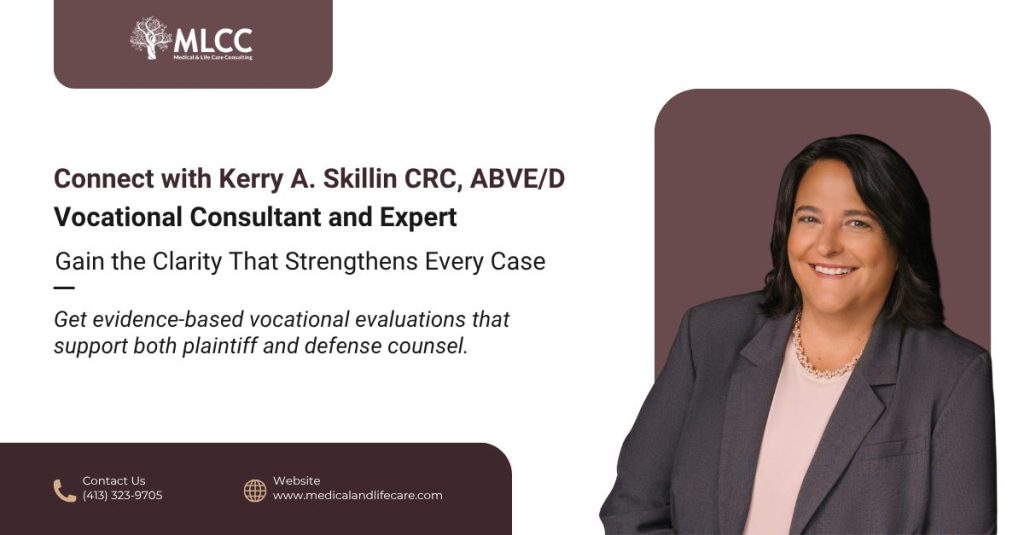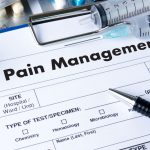In today’s legal environment, credibility is currency. Especially in cases involving employability, earning capacity, or ability to return to work, few forms of evidence hold more influence than a clear, defensible vocational evaluation. It is not just an assessment — it is a strategic instrument. A properly executed vocational evaluation takes complex case information and translates them into clear, objective, courtroom-ready evidence that attorneys can use to decisively strengthen their position.
At Medical & Life Care Consulting (MLCC), we partner with law firms and claims professionals throughout Connecticut and Massachusetts, with full capacity to support cases nationwide. Our vocational expert has handled cases from coast to coast, applying a uniform, evidence-based methodology trusted by both the plaintiff and defendant bar.
What Is a Vocational Evaluation?
A vocational evaluation is a forensic assessment that determines an individual’s capacity to work, earn income, and realistically participate in the labor market after an injury, disability, employment disruption, or significant life event.
Unlike a general medical summary, a vocational evaluation combines clinical findings, occupational analysis, and labor market evidence. It does not stop at identifying functional limitations. It establishes what those limitations mean in practical, economic, and real-world employment terms.
A defensible vocational evaluation typically analyzes and synthesizes:
- Age, education, work history, and transferable skills
- Medical, academic and psychological records and relate to work capacity
- Tax returns and job search records as part of employability analysis
- Vocational testing
- Current, region-specific labor market and wage data
At its core, the evaluation answers critical litigation questions:
- Can this individual return to work in any capacity
- If employable, what type of work is suitable, how soon could they re-enter the labor market, and what is their earning potential
- If they cannot return to suitable work, what vocational rehabilitation or retraining would be necessary, and at what projected cost, duration, and employment outcome
When executed correctly, a vocational evaluation is not simply informational. It becomes a strategic legal tool that can prove, defend, or dismantle claims involving employability and economic loss.
Why Vocational Evidence Matters in Litigation
In high-stakes litigation, attorneys must prove more than the existence of an injury or limitation. They must prove economic consequence. Courts and mediators ultimately focus on financial impact and employability, not just diagnosis or impairment. This is where vocational evidence becomes critical.
A vocational evaluation transforms theoretical claims into quantifiable, real-world findings by addressing questions that directly influence case value and settlement strength:
- Can the individual return to their prior job, or is that no longer viable based on current functional capacity
- If not, what alternative occupations are suitable based on their existing skills, education, restrictions, and vocational capacity
- Is vocational rehabilitation or retraining reasonable, or would it be medically inappropriate or economically inefficient
- What is the measurable difference between pre-injury and post-injury earning capacity, expressed using verified wage data rather than assumption
- Are there real, available jobs in the current labor market that match this person’s qualifications and functional abilities
Without a defensible vocational report, these questions remain subjective, open to dispute, and easily challenged. This weakens negotiation leverage, prolongs litigation, and increases risk exposure.
A strong vocational evaluation removes speculation. It provides attorneys with objective, peer-reviewed methodology that supports case strategy, withstands scrutiny, and drives stronger outcomes.
What Makes a Vocational Evaluation Defensible?
A vocational evaluation is only as strong as its ability to withstand cross-examination, peer review, and judicial scrutiny. To be legally reliable, it must be grounded in transparent, objective, and professionally accepted methodology. The most defensible evaluations consistently demonstrate the following:
1. Methodological Consistency
The evaluation must follow recognized forensic standards, using credible and accepted tools such as:
- The Dictionary of Occupational Titles (DOT) and O*NET
- Validated vocational aptitude and functional capacity assessments
- Verified labor market analytics based on current employment conditions, not anecdotal job listings or speculative assumptions
2. Evidence-Based Conclusions
All findings must be rooted in clearly documented evidence, including:
- Physician-confirmed functional limitations
- Objective vocational testing results
- Verified wage data and employer demand within the relevant labor market
3. Alignment With Medical Findings
A vocational expert cannot replace or contradict medical authority. Instead, the evaluation must translate medical restrictions into functional and economic impact, ensuring that every opinion is consistent with the treating and reporting physicians.
4. Clarity and Legal Usability
A defensible evaluation is written for legal decision-makers, not clinicians. It is structured for clarity and accessibility, often including:
- A concise executive summary
- Side-by-side comparison of pre-injury and post-injury employability
- Clear explanation of job matching logic supported by measurable criteria
5. Current and Locally Relevant Labor Market Validation
The evaluation must rely on current employment conditions specific to the individual’s geographic labor market, rather than outdated statistics or national averages that fail to reflect actual job availability.
How Defensible Evaluations Strengthen Legal Strategy
A high-quality vocational evaluation is not a passive document. It is a strategic tool that directly influences case direction, negotiation leverage, and expert positioning.
Establishing or Challenging Economic Damages
A defensible evaluation provides a clear and data-backed basis for calculating loss of earning capacity. It allows attorneys to confidently substantiate damages or, when appropriate, to dismantle inflated or speculative economic claims.
Enhancing Expert Testimony
When every conclusion is supported by objective methodology, the vocational expert can deliver strong, persuasive testimony. The evaluation becomes defensible under cross-examination because it is rooted in credible analysis rather than opinion.
Strengthening Negotiation and Settlement Position
A well-supported vocational report reduces uncertainty and limits speculation. This often leads to earlier and more favorable settlement outcomes because opposing counsel recognizes that the evidence is objective, measurable, and difficult to dispute.
Clarifying Complex Medical-Legal Narratives
A vocational evaluation translates medical findings into practical financial impact. It explains not only what the individual cannot do, but also what they realistically can do, at what wage level, and within what timeline. This provides clarity for attorneys, judges, mediators, and claims professionals.
The Power of Clarity and Credibility
A clear and defensible vocational evaluation does far more than assess employability or work capacity. It provides attorneys with objective, strategically useful evidence that supports economic arguments, strengthens expert testimony, and improves negotiation outcomes.
When every conclusion is supported by transparent methodology, consistent with verified medical findings, and grounded in current labor market realities, the evaluation becomes a high-value legal asset rather than a narrative document.
At Medical & Life Care Consulting (MLCC), our vocational expert, Kerry A. Skillin, CRC, CVE, ABVE/D, brings nationally recognized expertise to cases throughout Connecticut and Massachusetts, with the ability to support litigation nationwide. Her evaluations are trusted by both plaintiff and defense counsel for their precision, transparency, and ability to withstand cross-examination.
A strong vocational evaluation does not simply support a case.
It defines it — with clarity, credibility, and economic precision.







